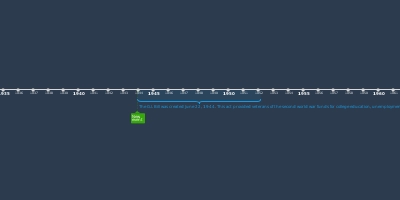New timeline
Category: Other
Updated: 19 Apr 2019
Contributors

Created bySergio Gomez
Attachments
Events
SNCC: The Student Nonviolent Coordinating Committee was one of the major American Civil Rights Movement organizations of the 1960s. It emerged from the first wave of student sit-ins and formed at a May 1960 meeting organized by Ella Baker at Shaw University.MLK Speech: "I Have a Dream" is a public speech that was delivered by American civil rights activist Martin Luther King Jr. during the March on Washington for Jobs and Freedom on August 28, 1963, in which he called for civil and economic rights and an end to racism in the United States.UFW: The United Farm Workers of America, or more commonly just United Farm Workers, is a labor union for farm workers in the United States.SCLC: The Southern Christian Leadership Conference is an African-American civil rights organization. SCLC, which is closely associated with its first president, Martin Luther King Jr., had a large role in the American civil rights movement.EisenHower Elected: The 1952 United States presidential election was the 42nd quadrennial presidential election. It was held on Tuesday, November 4, 1952. Republican Dwight D. Eisenhower won a landslide victory over Democrat Adlai Stevenson, ending a string of Democratic Party wins that stretched back to 1932.JFK assassination: John Fitzgerald Kennedy, the 35th President of the United States, was assassinated on November 22, 1963, at 12:30 p.m. Central Standard Time in Dallas, Texas, while riding in a presidential motorcade through Dealey Plaza.Civil Rights Act of 1964: The Civil Rights Act of 1964 is a landmark civil rights and labor law in the United States that outlaws discrimination based on race, color, religion, sex, or national origin. It prohibits unequal application of voter registration requirements, and racial segregation in schools, employment, and public accommodations.Voting right act of 1965: signed into law by President Lyndon B. Johnson, aimed to overcome legal barriers at the state and local levels that prevented African Americans from exercising their right to vote as guaranteed under the 15th Amendment to the U.S. Constitution.Johnson's war on poverty: The War on Poverty is the unofficial name for legislation first introduced by United States President Lyndon B. Johnson during his State of the Union address on Wednesday, January 8, 1964. This legislation was proposed by Johnson in response to a national poverty rate of around nineteen percent.Periods
Montgomery bus boycott: The Montgomery bus boycott was a political and social protest campaign against the policy of racial segregation on the public transit system of Montgomery, Alabama. It was a seminal event in the civil rights movement.Freedom Riders: were civil rights activists who rode interstate buses into the segregated southern United States in 1961 and subsequent years to challenge the non-enforcement of the United States Supreme Court decisions Morgan v. Virginia (1946) and Boynton v. Virginia (1960), which ruled that segregated public buses were unconstitutional. The Southern states had ignored the rulings and the federal government did nothing to enforce them. The first Freedom Ride left Washington, D.C. on May 4, 1961, and was Cesar Chavez: Born near Yuma, Arizona, on March 31, 1927, Cesar Chavez employed nonviolent means to bring attention to the plight of farm workers, and formed both the National Farm Workers Association, which later became United Farm Workers.Delano Table grape strike: The Delano grape strike was a labor strike by the Agricultural Workers Organizing Committee and the United Farm Workers against grape growers in California. The strike began on September 8, 1965, and lasted more than five years.JFK elected: In a closely contested election, Democrat John F. Kennedy defeated incumbent Vice President Richard Nixon, the Republican Party nominee. ... Kennedy won a 303 to 219 Electoral College victory, and is generally considered to have won the national popular vote by 112,827, a margin of 0.17 percent.
Comments